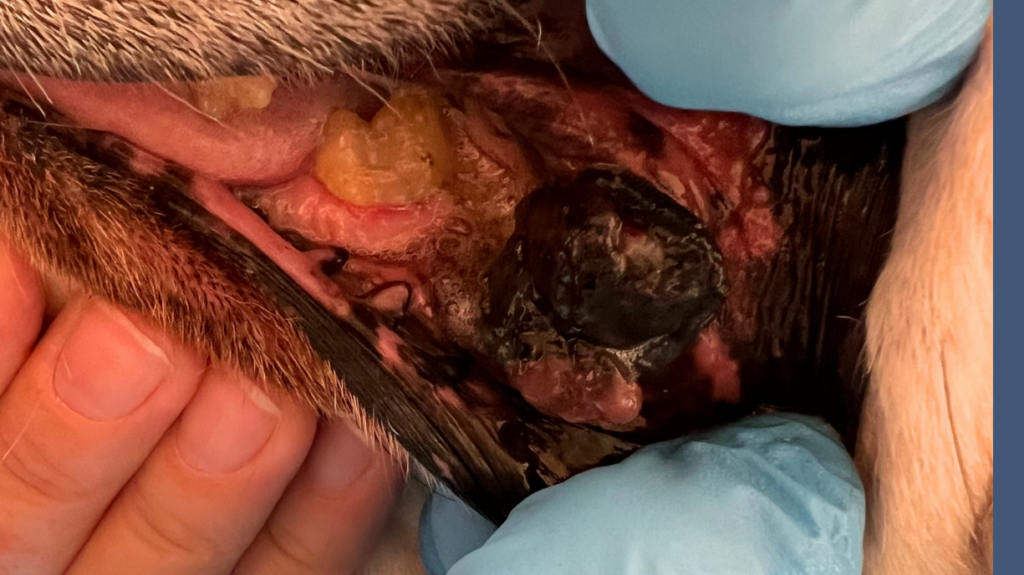Oral Malignant Melanoma
This is Stella, a 13.5-year-old female, spayed Beagle. Stella’s primary veterinarian at Ashland Veterinary Hospital referred her to Partner’s Oncology department in Richmond for further evaluation of a suspected oral melanoma that was discovered during her routine oral exam.
Dr. Melissa Miller, Practice Limited to Medical Oncology, Pet-Loss Grief Support Specialist (C) took Stella under her care. X-rays of her thoracic area were taken to rule out pulmonary metastasis and bloodwork was done in preparation for planned anesthesia.


The mass was removed without any complications and the histopathology—or study of the mass tissues—confirmed a diagnosis of Oral Malignant Melanoma (OMM). During the surgery, a piece of the tissue was frozen and submitted (after diagnosis was confirmed) to a company called Torigen so a specifically-formulated vaccine could be made for Stella.
The vaccine therapy began at the time of Stella’s surgical recheck with the additional doses administered once weekly for a total of three vaccinations. Dr. Miller also recommended that Stella have an oral examination and thoracic x-rays every 3 months for the first year.
Thankfully, Stella recovered from surgery and tolerated her vaccine injections without any trouble. She was last evaluated at Partner Oncology on January 25th, 2024 (6 months post diagnosis) with no visible local recurrence in her oral cavity, no evidence of enlarged lymph nodes, and no pulmonary metastasis on thoracic imaging.
What We Know
OMM is the most common malignant oral tumor in dogs. While melanoma has been associated with UV light exposure in humans, the etiology of melanoma in dogs is largely unknown. OMM is locally invasive and has a high metastatic rate to regional lymph nodes, lung tissue, and many other sites. Therefore, the ideal treatment of choice is a combination of local therapy (surgery and/or radiation therapy) and systemic therapy (chemotherapy and/or immunotherapy in the form of melanoma vaccines).
Surgery is often the first step in therapy, to confirm a diagnosis and/or to provide local tumor control. If radical surgery is not a viable option, radiation therapy is often recommended in its place. Local tumor control is the first step, but the most important factor for many OMM patients is systemic cancer control.
Chemotherapy has historically been the systemic therapy of choice for most cancers, but melanoma tends to be more resistant to drug therapy than other cancer types. Patients with metastatic disease at the time of diagnosis, though, may benefit from chemotherapy. However, the goal is usually to slow normal cancer progression with response rates being variable.
In more recent years, targeted therapy has been investigated for the treatment of OMM in dogs. Genetic testing and targeted oral chemotherapy options are now available through a company called FidoCure.
Immunotherapy has been developed for the treatment of OMM and the results have been far more encouraging than with chemotherapy protocols, and this is currently the standard of care for OMM in dogs. Non-steroidal anti-inflammatory drugs have been reported to have benefits in 15% to 25% of patients who receive these medications.
Melanoma tumor vaccines, though, have been the most promising. Merial’s vaccine called ONCEPT is USDA-approved and reports median survival times of 1 to 1.5 years, even in patients with advanced stage disease. Autologous vaccines are also available from Torigen if fresh cancer tissue can be collected and sent for vaccine formulation.
Key Points:
- Oral malignant melanoma (OMM) is the most common malignant oral tumor in dogs.
- Oral masses in older dogs may be incidental findings and oral evaluation should be encouraged at all routine veterinary visits.
- Regional lymph-node sampling and thoracic imaging are key staging diagnostics for oral masses prior to treatment planning.
- Immunotherapy is a core therapy for OMM management and autologous cancer vaccine therapy (created from the patient’s own cells or tissues) is a cost-effective and safe alternative systemic therapy to historic standardized treatment protocols.
Ready to fight cancer? So are we! If your pet has been diagnosed with cancer, contact us.
